No yard? No problem. She’ll teach you to grow mobile gardens that’ll shift your thinking
Hummingbirds hum. Chickens cluck. Domesticated wild cats attempt to find their way into the chicken coops. And squirrels crawl up the bird feeders to have a good old time — it’s fine dining up there, feasting on sunflower seeds. Taylor Lindsey’s mini urban farm in the South Los Angeles neighborhood where she lives with her parents is alive with hubbub.
With an aloe forest in the front yard, raised garden beds in the backyard, a pollinator patch, a variety of recycling and composting bins, rain barrels, fruit trees along the driveway and bird feeders all around, Lindsey has transformed all 300 square feet of her yard into a sustainability haven.
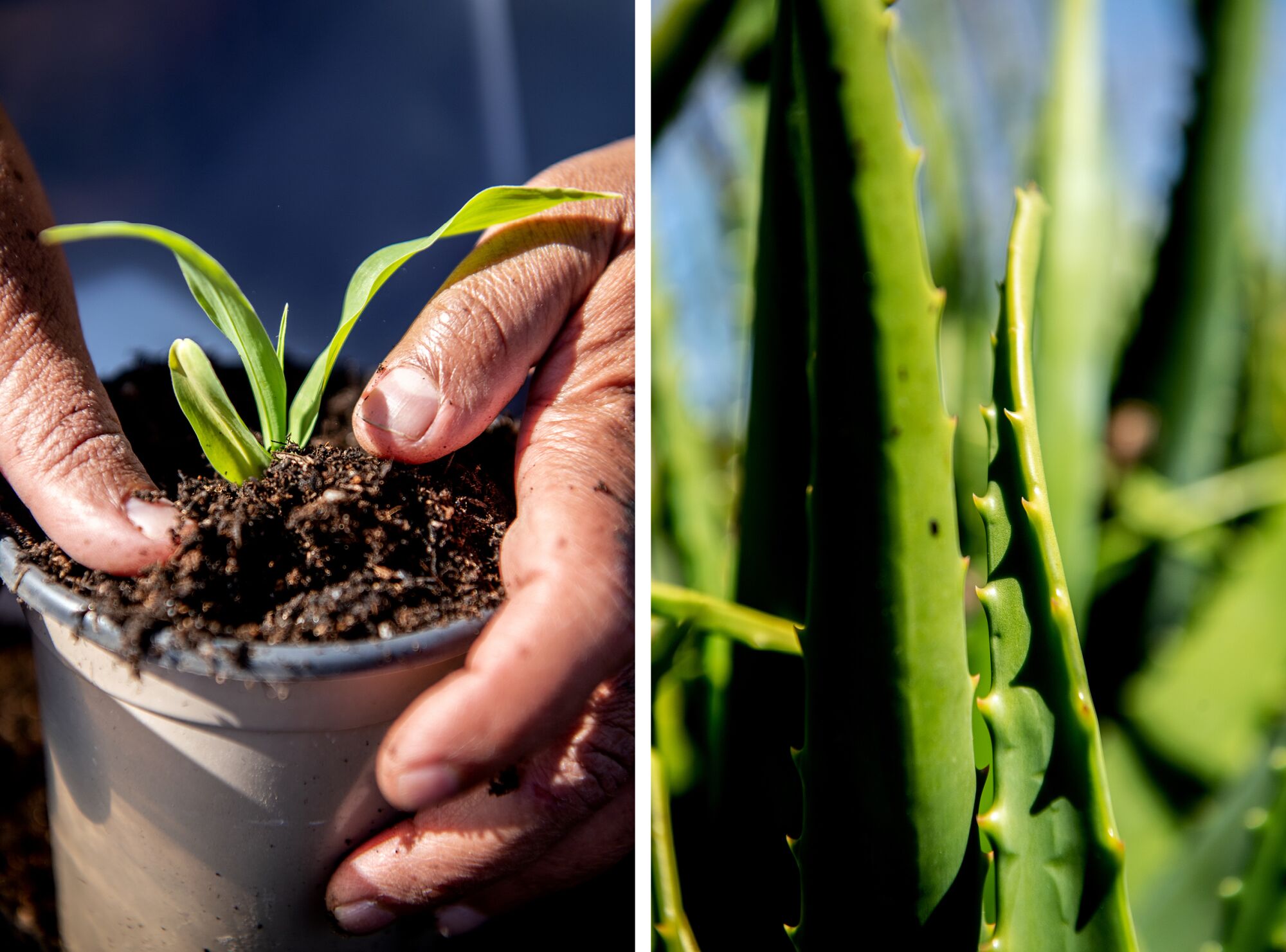
Lindsey demonstrates her process for fulfilling orders, left. An abundance of aloe plants, right, grow at her nursery in South Los Angeles.
(Mariah Tauger / Los Angeles Times)
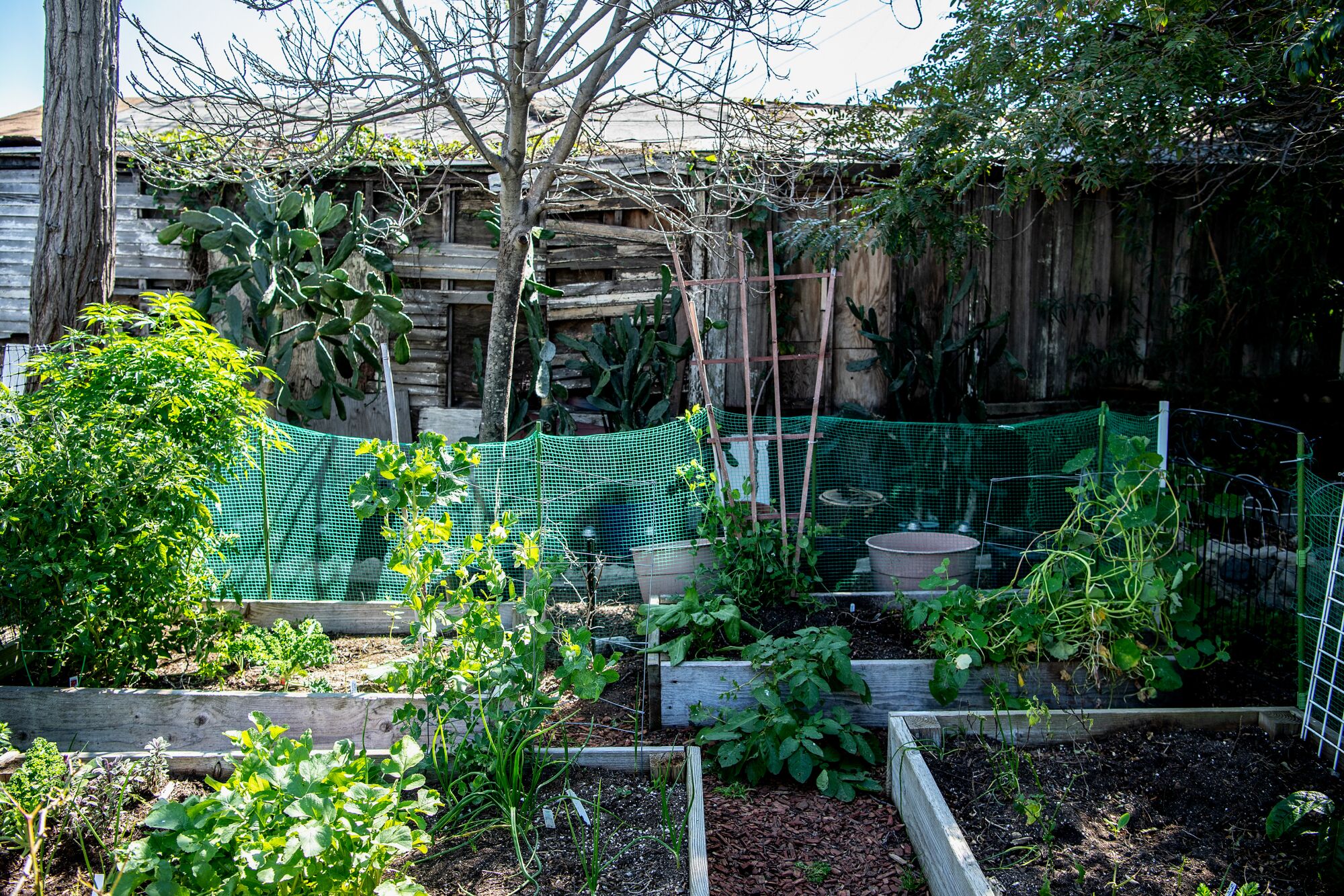
A view of Lindsey’s backyard garden in South Los Angeles.
(Mariah Tauger / Los Angeles Times)
“Which blows my mind, like, all this started with me just growing a pack of seeds on my parents’ back porch,” says Lindsey, 36, who moved to South L.A. nearly 24 years ago with her family. In 2016, she planted four packs of seeds, which resulted in 75 squash, kale and zucchini plants over the summer. At the time, she didn’t foresee that it was more than simply growing plants. She was cultivating a new life — and career — for herself.
Lindsey grew up in Jefferson Park in Pasadena and went to high school in Hollywood. As a kid, she wanted to be an animator and illustrator. Gesturing to cartoon tattoos that cover the left side of her body, she says she wanted to give people who mocked her something to look at, but eventually, the body art became meaningful to her. “They stared at me my entire life because I’m completely covered with freckles or I was a very overweight child, but also I’m mixed, right,” Lindsey says. “People were harassing me about my ethnicity. And I dealt with it until my mid-20s.”
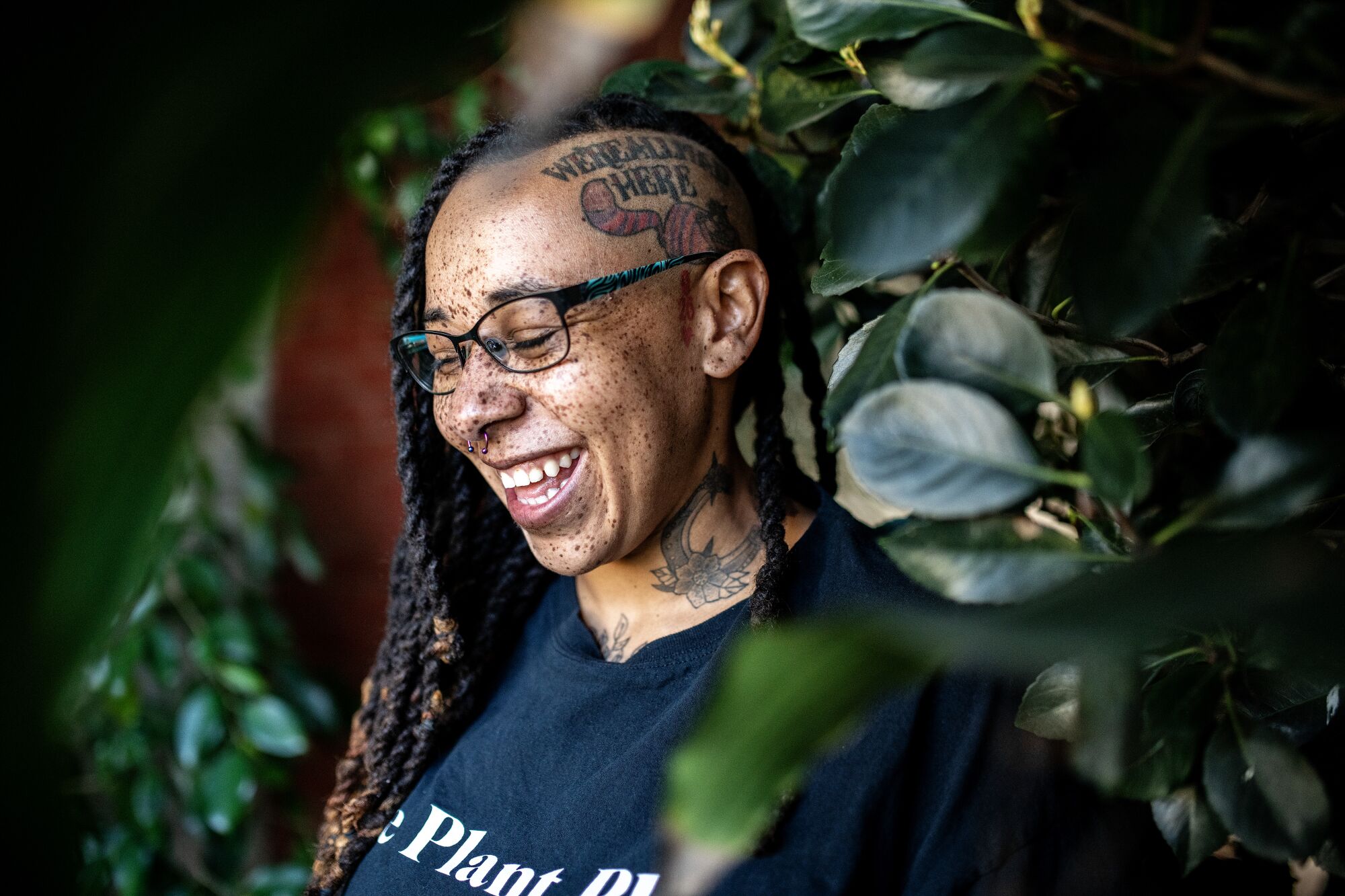
In 2016, Lindsey planted four packs of seeds, resulting in 75 squash, kale and zucchini plants over the summer — and inspiring her passion for gardening.
(Mariah Tauger / Los Angeles Times)
She first found a connection to plants during her high school years when her mother would take her to nurseries after school. “We get introduced to these things as kids, then our first science experiment fails and we give up on it,” Lindsey says. “I killed a bunch of plants.”
In 2016, once she began planting in earnest, she made the front yard into an aloe farm while using the backyard as her agriculture lab, experimenting with potatoes, collards, sunflowers and peppers. Within three years of home gardening — and attending workshops and visiting community gardens to learn as much as she could, especially in terms of growing native plants — she was growing nearly 100 new plants each week.
In 2019, Lindsey founded the Plant Plug, a plant shop she operates out of her backyard, providing affordable seasonal vegetables as well as rare plants. Her mission was to bring organic produce to Los Angeles residents’ backyards, porches and balconies. Having spent her formative years “in the heart of South Central,” she felt an urgency to fulfill a need amid an underserved population where accessible fresh food was a rare commodity. In 2020, with aisles of empty grocery store shelves haunting her during the pandemic, she realized she needed to do even more with plants. She started teaching — hosting monthly gardening workshops in her backyard as well as at other locations across the city in collaboration with the L.A. County Library, Sunnyside Baptist Church and Project 43.
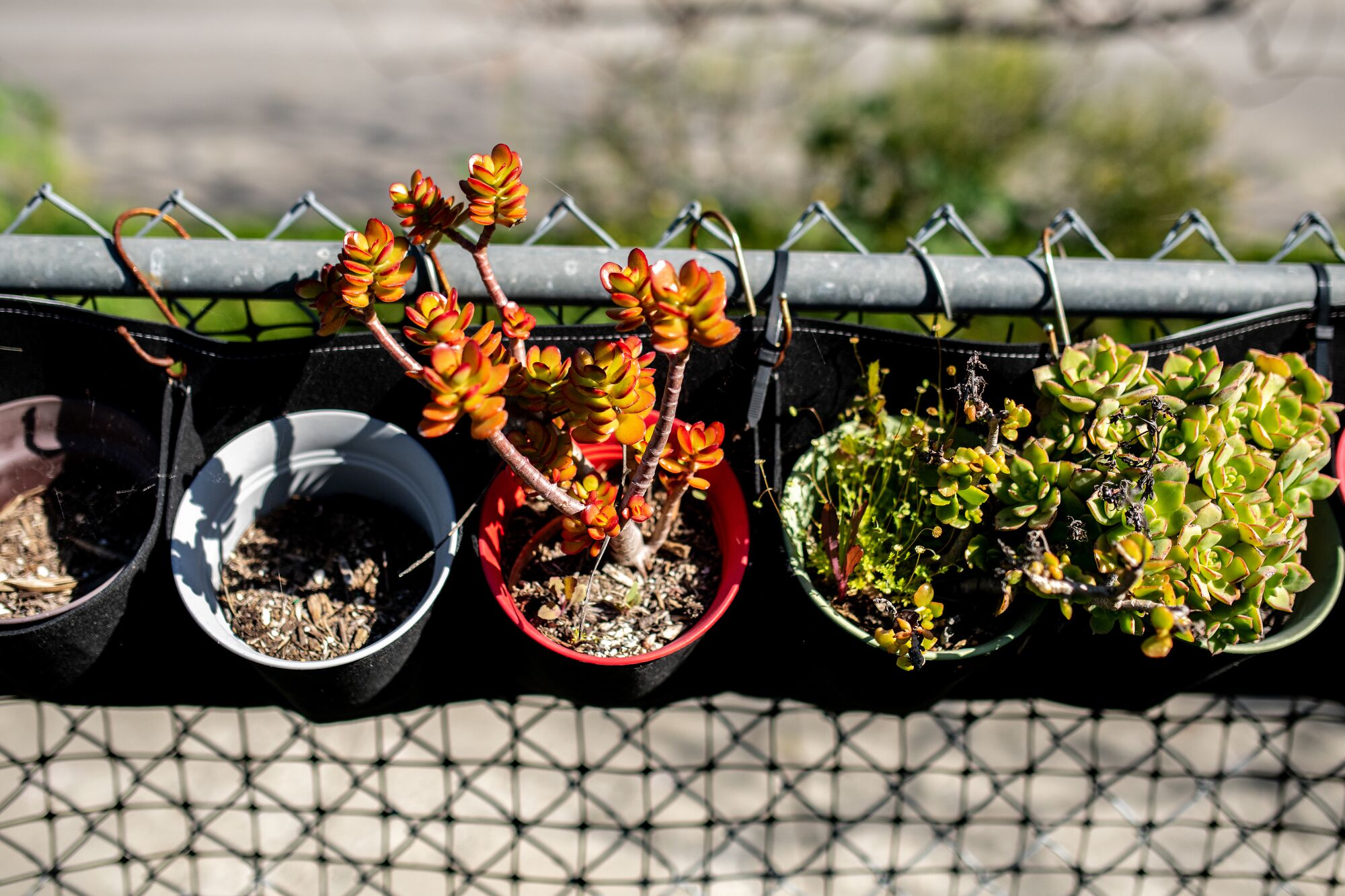
Lindsey was moved to make gardening more accessible, no matter how small a yard a person has.
(Mariah Tauger / Los Angeles Times)
Often, she will take on dying plants from clients and rehab them. Sometimes they can be saved or propagated; other times, there is nothing left to do but compost them. She has provided small batches of produce and aloe vera to makers of beauty products and in-home kitchen businesses. Her collaboration with Straight Up Fast Food, a South L.A.-based smoothie and juice delivery service, resulted in “Plug Juice” — a mint watermelon cold-pressed juice named after her.
Kushmir Capers started working for Lindsey in early 2020 to help facilitate workshops. “I became an apprentice of her work, just learning things,” he says. “[Taylor is] someone doing this community work, trying to make this world a better place.” Now a Compton Community Garden director, he still helps Lindsey on a volunteer basis, assisting with organizing events as well as doing videography for the business.
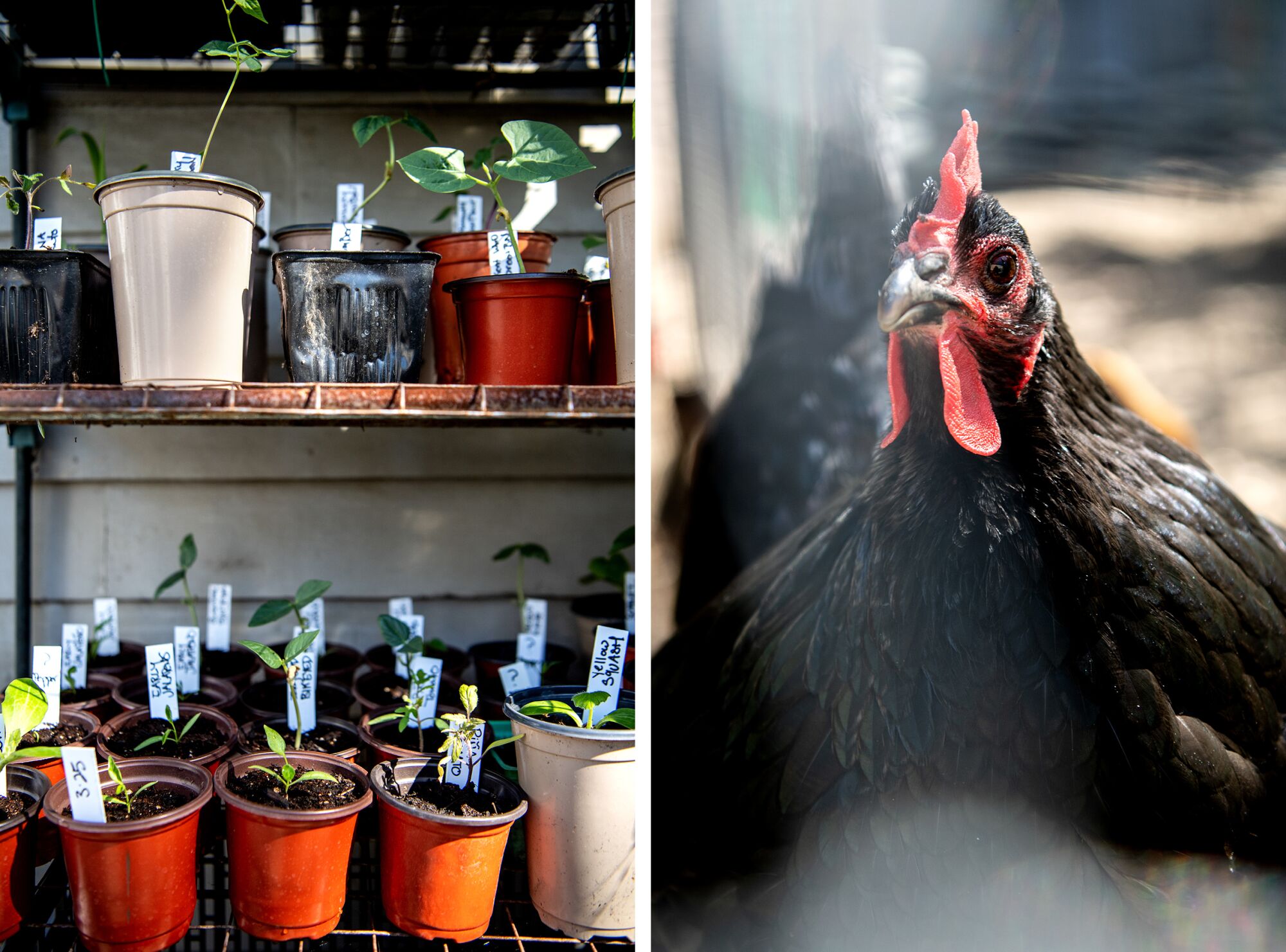
Some of the plants available for purchase, left, and a chicken soaking up the sun, right, at the Plant Plug nursery in South Los Angeles.
(Mariah Tauger / Los Angeles Times)
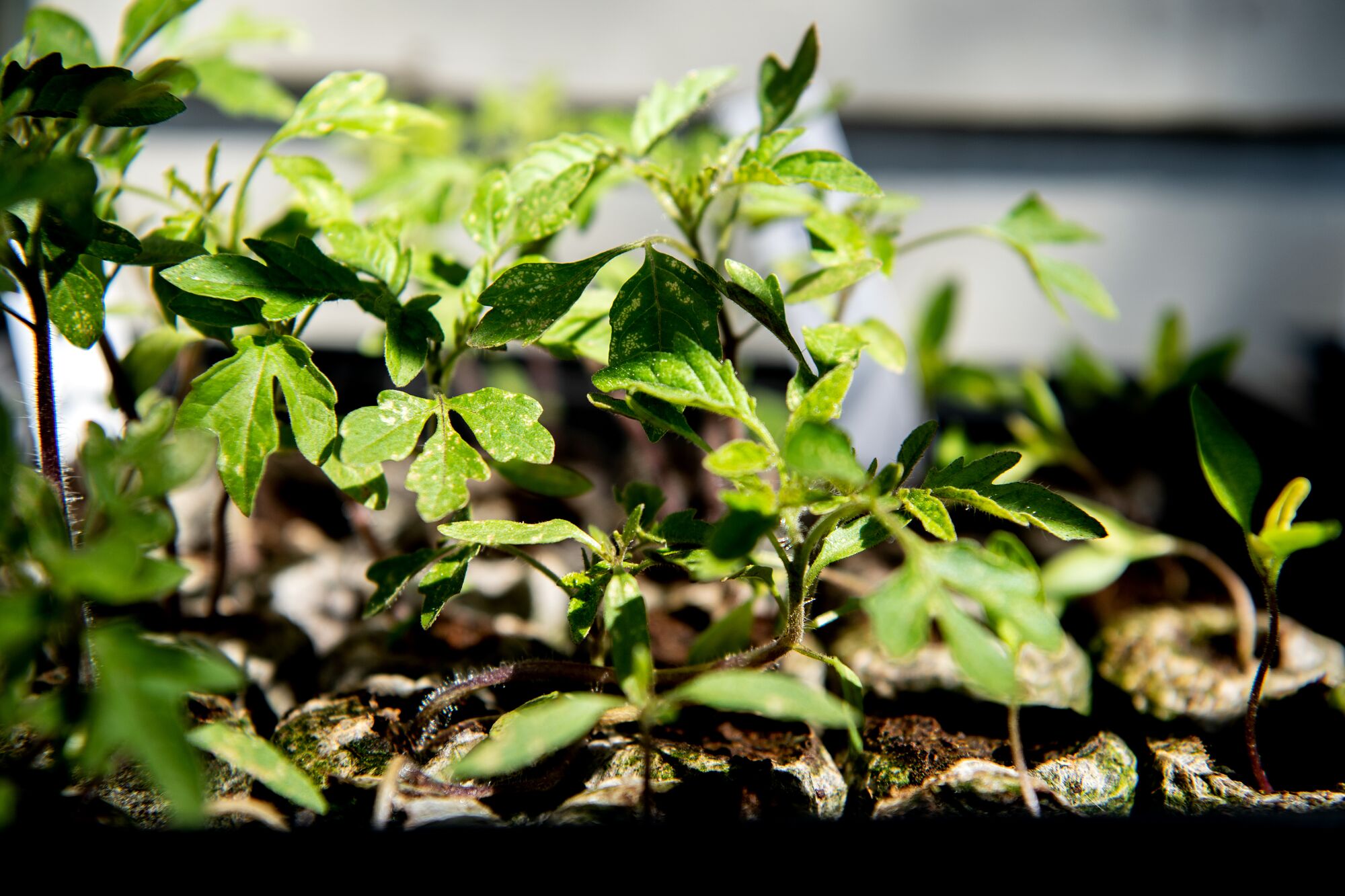
Lindsey is “trying to make this world a better place,” says Kushmir Capers, who volunteers with the Plant Plug.
(Mariah Tauger / Los Angeles Times)
Often people come to Lindsey’s workshops with an “I don’t have a yard, I can’t grow” mindset, says Capers. To prove them wrong, the Plant Plug has held crate garden-building workshops. Instructors provide information on plant history and care, as well as mobile crate gardens that participants fill with organic, hand-mixed soil and edible seedlings, and then take home. The versatile mini gardens can be placed on a patio or balcony or even indoors if the area gets enough sun. “It’s more artisanal, it’s more hands-on, more love energy, you know, went into this product,” Capers says, adding that participants have reported back on their thriving plants at home.
Irelia Orteza runs Cosmic Rose Apothecary, a small business offering handcrafted herbal oil infusions and skin products. When she first found out about Lindsey’s workshops through Instagram, Orteza had experience growing flowers at home for her herbal products but “felt like food was so much more complicated.”
She attended one of Lindsey’s urban farming workshops and left feeling empowered, with an array of seedlings purchased from the Plant Plug. “Taylor came over to my home and literally helped me plant,” she says. “[Our] hands were in the dirt, and we were really just building friendship and community. I felt like, I can do this. I can give love and water and sunshine to a seed, and in return, I will get some food.” Her latest crop includes lettuce, tomatoes, peppers, cucumbers and zucchini.
In October 2021, Lindsey started “The Plant Plug Podcast,” which includes conversations with a diverse local lineup, all of whom end up sharing some connection to gardening. “I had a DJ on my show, and he was telling me about his family growing avocados in Mexico,” Lindsey says.
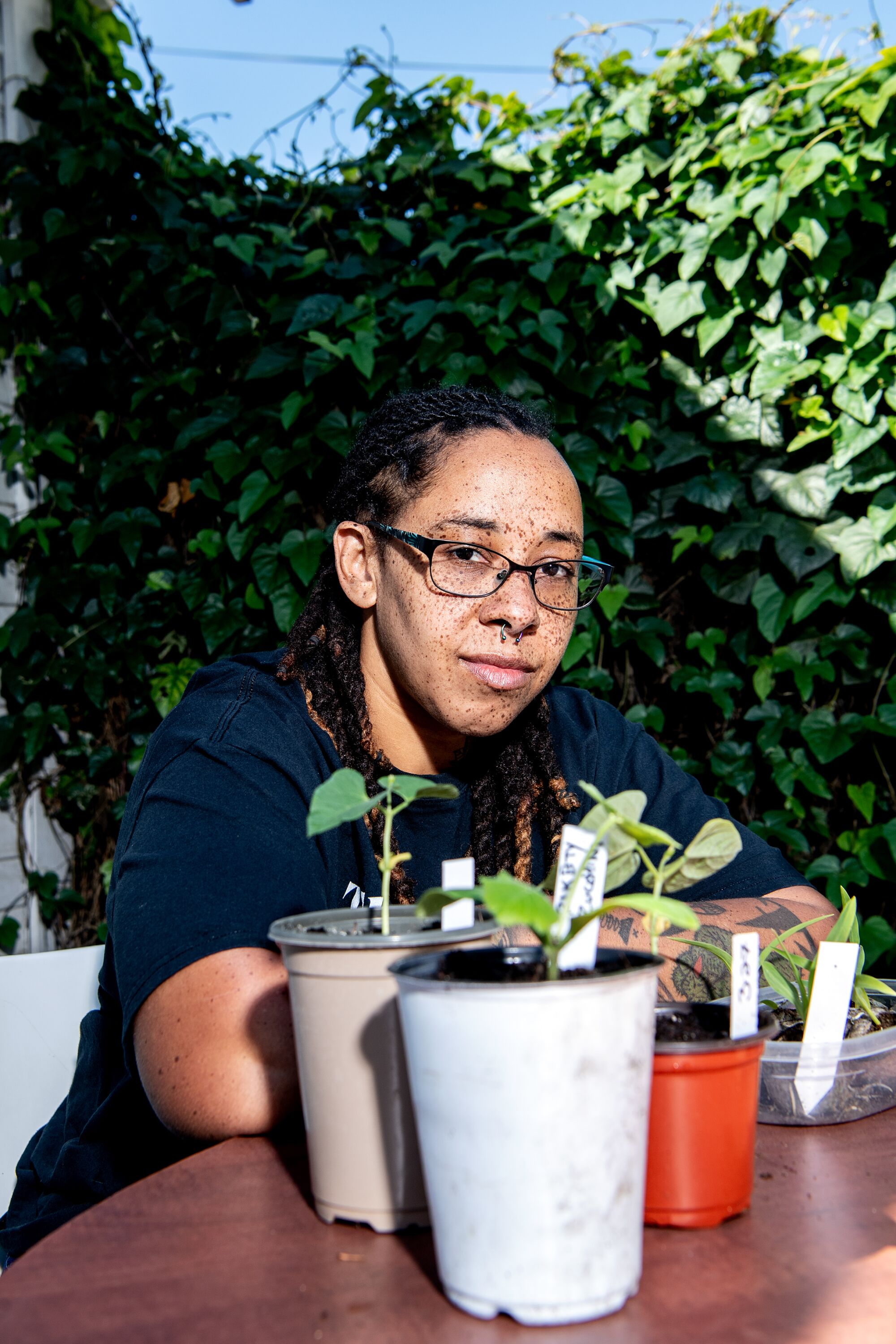
Lindsey also runs “The Plant Plug Podcast,” which features gardening-related conversations with a diverse local lineup.
(Mariah Tauger / Los Angeles Times)
Her first episode was on harm reduction for drug use. The subject matter was personal: “I was doing what I thought 20-year-olds were supposed to be doing: partying. It was a lot of fun. But then things got really, really dark. My drinking got out of control,” Lindsey says. “I found out that I was an alcoholic, and [I was] in the hospital a lot because of my drinking at the time. And I didn’t really know what to do with myself other than get sober. I was dying at 25 years.”
After getting sober at 26, she worked on and off at grocery stores, then grounded herself working in the fitness industry. She was a personal trainer before finding her true calling in plants, approaching gardening as more of a practice than a commodity.
Lindsey’s parents have been supportive throughout her gardening journey, providing space and resources. She says they’ve all been learning together. For a while, the family couldn’t grow anything in the backyard. The soil was all clay. Then they learned about above-ground gardens built with wood beds, took down measurements, went to Home Depot to gather the materials and got to work. Her father built much of the farm infrastructure from repurposed materials. Her mother, Sheila Harrison, says she feels lucky to have the yard space so Lindsey can nurture her passion. “She just has a knack for it. This is a natural gift she has that she can grow,” Harrison says. “She can grow from seed. Things are growing here because of her touch.”
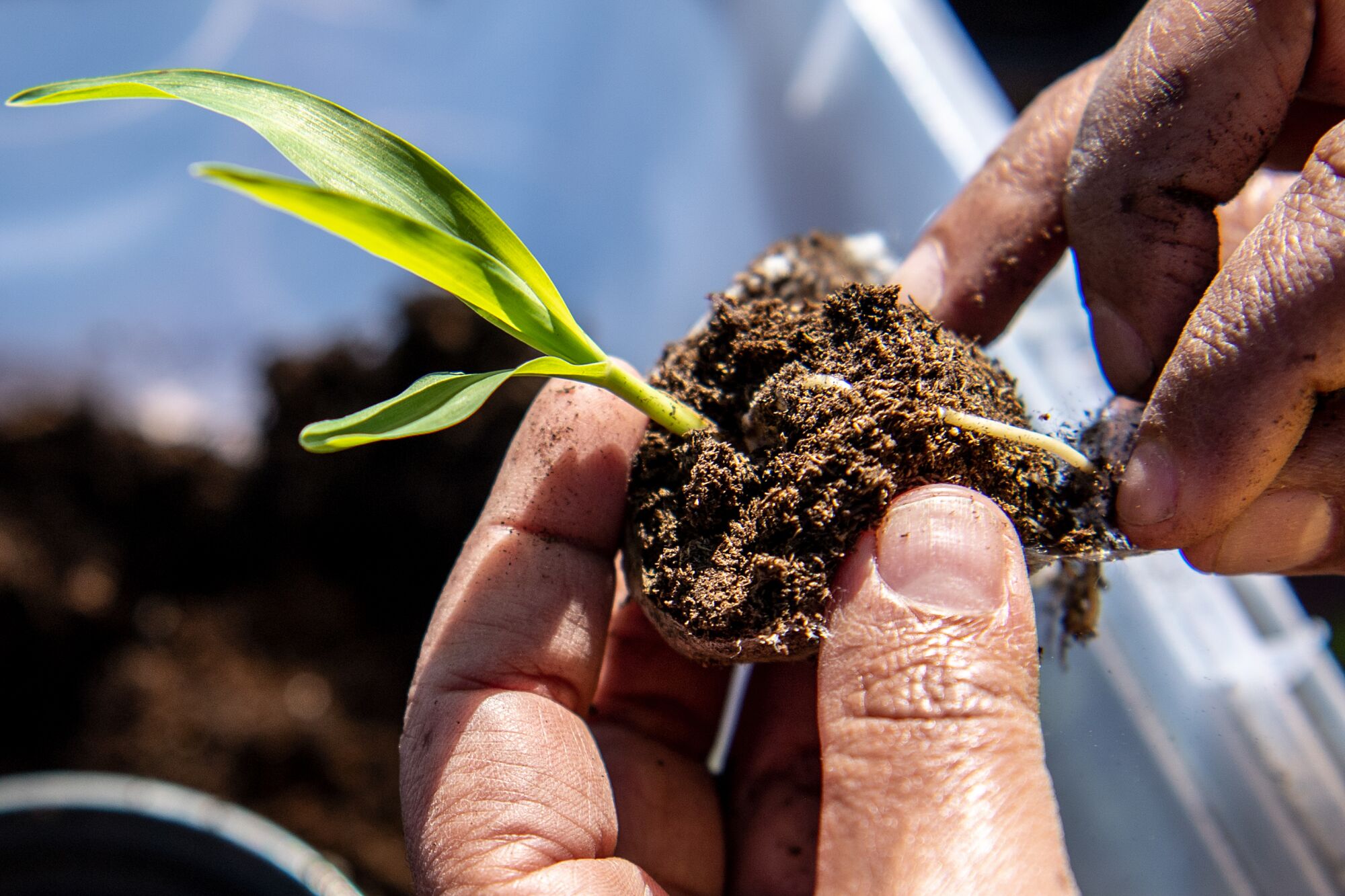
After shifting her focus to plant education and workshops, Lindsey now grows about 25 to 50 plants a week.
(Mariah Tauger / Los Angeles Times)
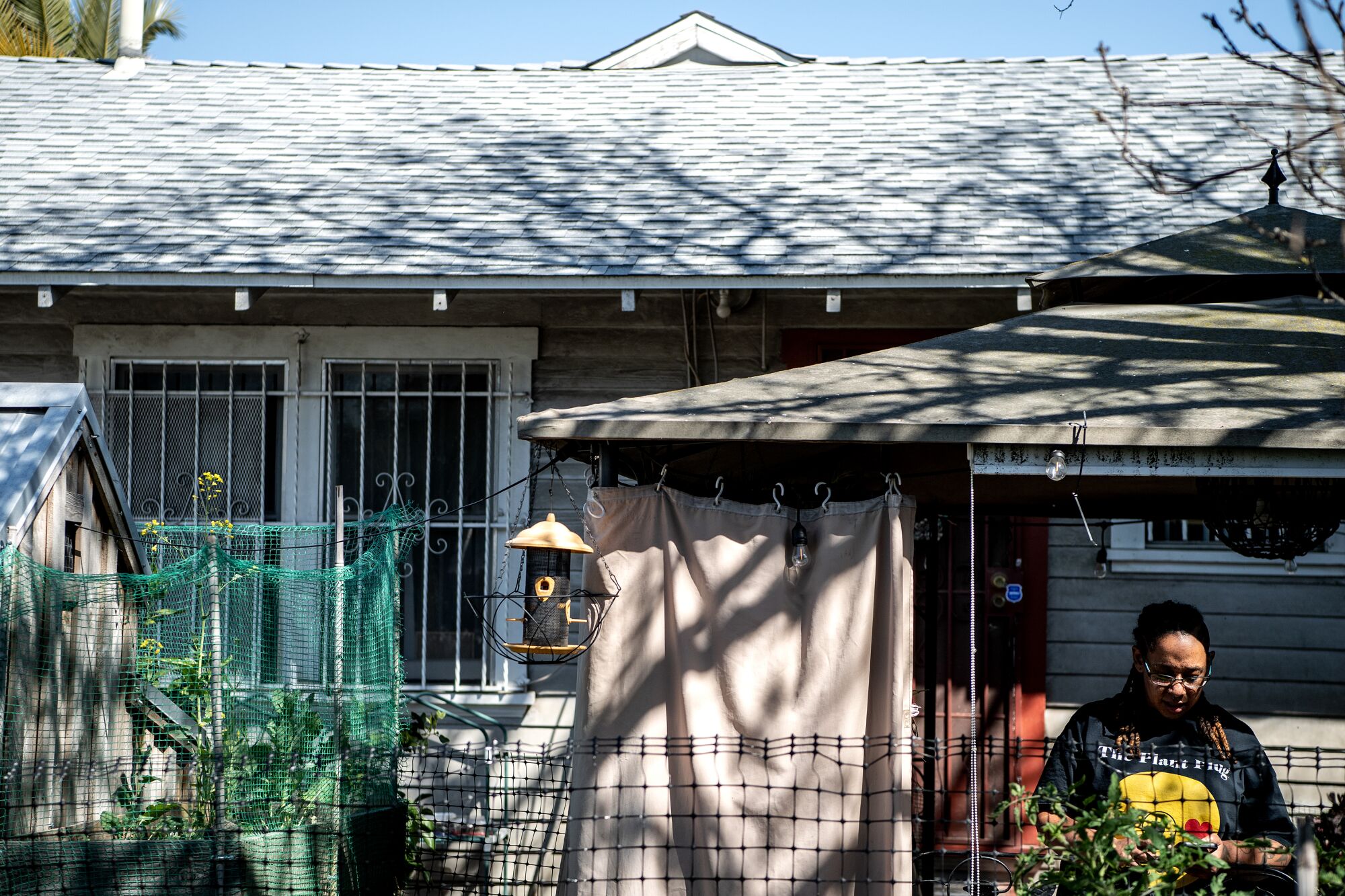
All 300 square feet of Lindsey’s yard has been turned into a sustainability haven.
(Mariah Tauger / Los Angeles Times)
Today, the space has become a sanctuary for Lindsey. Shifting her focus to plant education with more workshops, she now grows about 25 to 50 plants a week. She plans to start growing her own protein sources, like beans and peas, as well as plants that can survive high heat, like peppers, “being that we are going to have record heat waves more consistently with these aggressive climate changes.” She hopes to show people how to use seeds and community gardens to grow food themselves — embracing food sovereignty — in what she calls a Los Angeles food desert.
“If you told me that, as a teenager, as a 20-year-old, even five years ago, that this would be what I was doing,” Lindsey says, “like plants 24/7, like I’d go to sleep thinking about plants, I’d be like, ‘You’re lying.’”
Meet Taylor Lindsey at her next garden party.
For all the latest Life Style News Click Here
For the latest news and updates, follow us on Google News.
